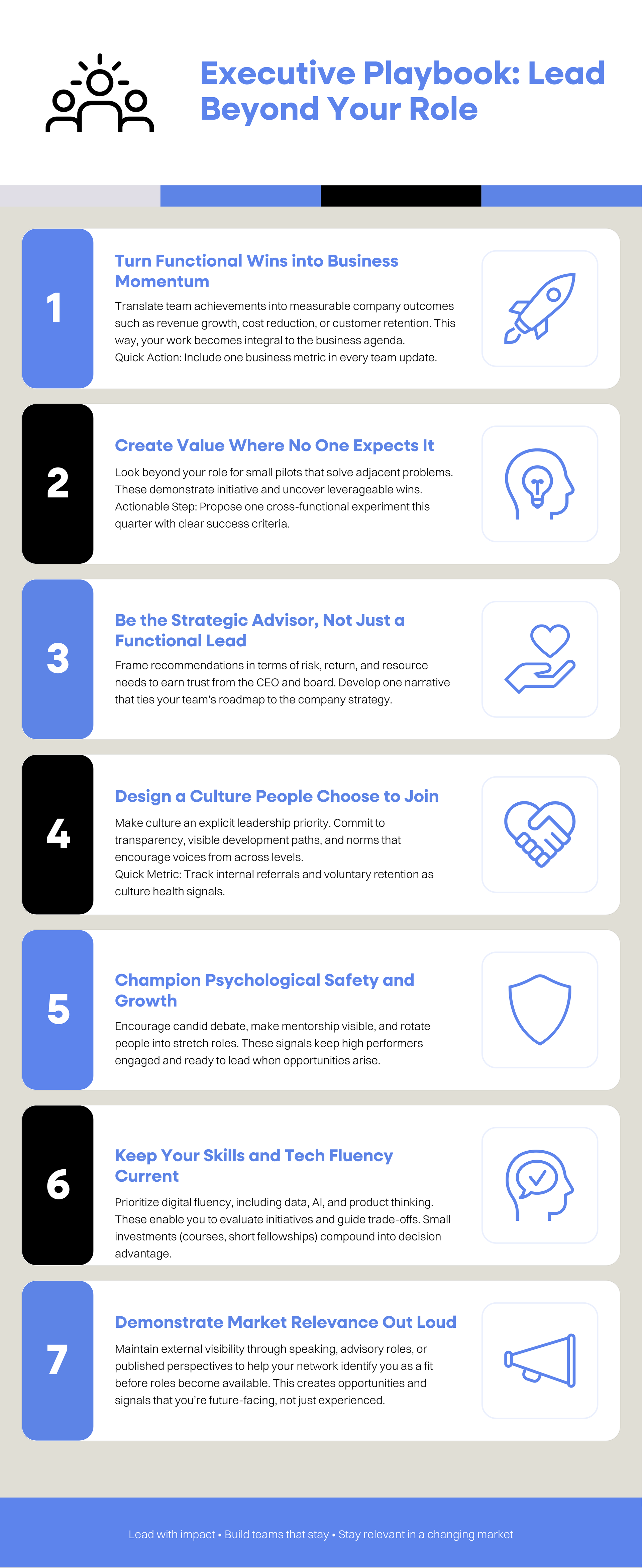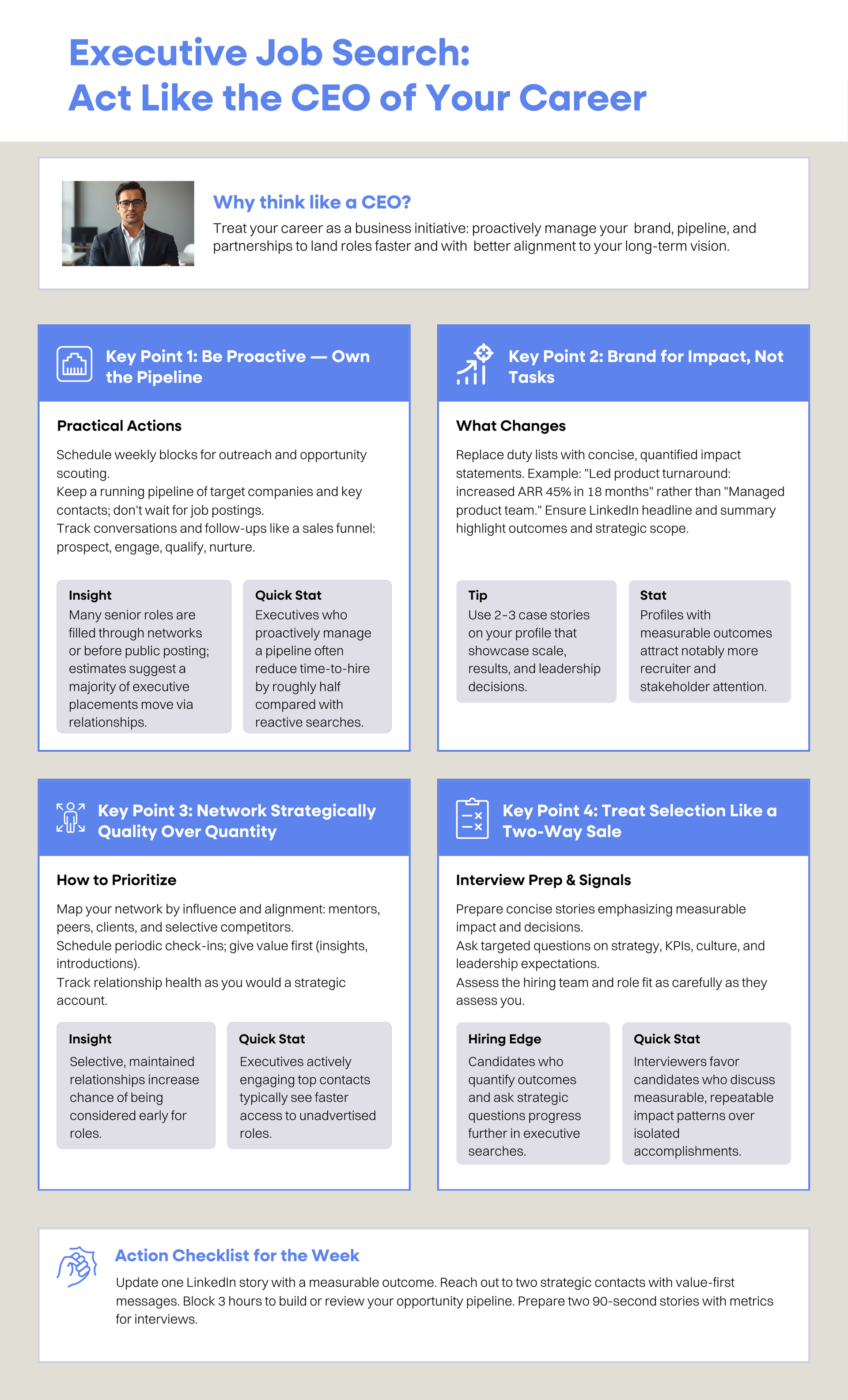How Executives Can Secure Long Term Roles for Lasting Career Success
TL;DR
- Create job security through value creation—especially in areas where value isn’t expected.
- Go beyond your function by influencing company-wide strategy, collaborating cross-functionally, and building trust with CEOs and board members.
- Build a culture that retains top talent by fostering psychological safety, clear communication, and growth opportunities.
- Stay market-relevant by developing new skills, embracing digital transformation, and leading with adaptability.
- Partner with top executive search firms to access hidden roles, navigate compensation, and align with the right culture.
- Treat your job search like a business: build your brand, expand your network, and be proactive—many senior roles are filled before they’re posted.
- Nail the executive interview process by telling impact-driven stories and evaluating company culture and fit just as much as they evaluate you.
- Think long game: Prioritize roles that offer influence, growth, and alignment with your personal and professional goals.
Introduction
There’s no shortage of senior executives who are technically qualified, but that’s no longer the only thing companies are looking for.
Today, landing (and keeping) a top-tier executive role means being more than just smart, experienced, and available. The most in-demand executive talent understands how to stay relevant, build a strong culture, and drive strategy at scale—and do it over the long run.
Executives must also develop skills such as collaborative problem-solving, critical thinking, and communication to lead effectively. An executive's communication skills are crucial for effective leadership and advocacy.
Let’s break down how executives can secure long-term roles by focusing on high-impact strategies that go beyond resumes and job boards. We'll dig into the leadership habits that actually sustain executive careers.
Main takeaway: Create job security through value creation. The more value you create, especially in areas where value isn't expected, the harder it becomes for organizations to imagine the future without you.
Drive Strategic Impact Beyond Your Lane
Most executives already know how to lead their own function. What separates long-term success stories from short-term hires is the ability to impact the broader business.
In nearly every long-tenured executive role I’ve seen, the common denominator was this: the executive wasn’t just leading their department, they were a business leader influencing company-wide strategy.
- They understood how to connect team initiatives to business outcomes.
- They collaborated cross-functionally, breaking silos between marketing, operations, and finance.
- They became trusted advisors to the CEO, board members, or other leaders on the executive team.
- They demonstrated strategic value by understanding key business metrics, financial statements, and industry trends.
In 2016, I joined a leadership and development program at Boeing, where I had the opportunity to observe several high-level executives interview. These experiences changed my perspective on interviews entirely. One of my biggest takeaways was understanding the difference between adding value where it's expected versus creating value where it’s not.
Delivering on expectations is necessary, but it’s not remarkable. Long-term executive career success comes from creating opportunities to drive value in areas others haven’t yet touched. This is a principle I coach all of my senior-level clients on. Whether we’re telling stories, building a career plan, or preparing for promotion, we focus on creating value, not just maintaining it.
Tip: Think about the most strategic project in your company right now. What would it take for your team to be seen as essential to that initiative?

Build a Culture Others Want to Be Part Of
When I coach senior talent through job transitions, one of the top reasons they cite for leaving is culture misalignment—not money, not title.
If you want to retain top talent (and secure your own spot long-term), the organization's culture can’t be an afterthought.
Senior executives need to take ownership of building environments where teams can thrive. That includes:
- Psychological safety – Does your team feel safe offering ideas, even when they challenge leadership?
- Open communication – Are you visible, available, and approachable, even when it’s uncomfortable?
- Growth opportunities – Are you making space for future executives to grow and lead?
- Supportive and transparent culture – Are you fostering an environment where trust and clarity drive team success?
- Well-being – Maintaining physical and emotional fitness directly impacts an executive's performance and resilience.
Strong culture is the leadership team’s responsibility. It’s not something that HR “handles.”
Executives who foster authentic team culture don’t just retain high performers, they attract them. That’s why executive recruiters will often ask about team engagement, morale, and development when they’re vetting candidates for long-term roles.
Stay Market-Relevant in a Changing Job Market
The executive job market is moving faster than it used to. Digital transformation, artificial intelligence, and new business models are shifting the goalposts.
Many organizations now expect their executive team to understand both strategic and technical implications of change. If you’re not keeping up, you’re falling behind. Leadership positions now require proficiency in digital solutions and data management to shape competitive advantage.
Some signs you’re staying market-relevant:
- You’re attending or speaking at industry events.
- You hold advisory roles or board seats outside of your day job.
- You proactively upskill; especially around AI, digital strategy, and change management.
- You focus on continuous learning, strategic relationship-building, demonstrating business acumen, and staying adaptable to build a stable career.
Continuously challenge yourself and develop new skills by:
- Taking on challenging projects require new skills and demonstrate value creation.
- Volunteering for high-impact, cross-functional projects that keep your skills sharp.
One of the biggest misconceptions I hear from senior leaders is: “I already have enough experience.”
Experience is not the same as relevance.
Partner with the Right Executive Search Firm
Not all executive search firms are created equal.
The best ones don’t just “fill jobs." They act as strategic partners to both companies and candidates. They understand organizational culture, competitive compensation benchmarks, and the nuances of the hiring process for leadership roles.
Partnering with specialized executive search firms improves candidate quality and reduces hiring risks. A strong executive recruiting strategy attracts the best candidates and aligns them with corporate goals.
If you're actively searching, working with an experienced executive recruiter can help you:
- Access unlisted opportunities not posted on public job boards.
- Navigate executive compensation and benefits negotiations.
- Evaluate cultural fit with the leadership team.
- Build a long-term career plan aligned with your personal goals.
Pro Tip: You don’t need to wait until you’re job searching to build relationships with recruiters. Staying on their radar can open doors to new executive roles before the search even begins. Keeping things confidential is key when conducting a passive job search. Executive search firms do just that.

Job Search Strategy: Act Like the CEO of Your Own Career

The best job search strategy isn’t reactive, it’s strategic.
Executives who treat their job search like a business initiative tend to land faster, in better roles, with fewer trade-offs.
What this looks like in practice:
- Brand: Your LinkedIn and resume should speak to impact, not just duties.
- Visibility: Building a personal brand is essential for enhancing visibility in the job market.
- Network: Actively build relationships with clients, peers, mentors, and yes—even competitors.
- Execution: Set aside weekly time to explore opportunities, follow up with recruiters, and reach out to companies aligned with your goals.
And most importantly, don’t wait for job openings to start looking.
Many senior roles are filled before they’re ever listed. By then, qualified candidates are already in the pipeline.
Navigating Executive Search and Selection
You could be the most qualified executive on paper and still lose out in the selection process if you’re not strategic about executive search best practices.
Here’s what top executives do differently:
- They come to interviews with stories about measurable impact.
- They ask pointed questions about company culture, business strategy, and expectations for long-term commitment.
- They assess the leadership position and hiring team with the same rigor they apply to their own hiring.
Don’t just aim to “get the job.” Evaluate whether the current position aligns with your long-term vision, your values, and the kind of impact you want to have in your next role.
If you want to step your interview game up to that of an executive, check out my guide to interview success.

The Long Game: Career Advancement and Long Term Commitment
Career advancement at the executive level isn’t just about title bumps.
It’s about making intentional moves that:
- Expand your strategic influence.
- Offer room to grow alongside the organization.
- Align with your personal and professional development.
Every move should put you closer to the work that energizes you, not just what looks good on paper.
Executives with long-term success usually have a mix of:
- A strong personal brand (they’re known in their space).
- A pattern of delivering great outcomes in multiple roles.
- Clear values and emotional intelligence to lead through change.
- A broad and diverse network to ensure career growth and flexibility.
If you're in your current role and feel like you're stagnating, now might be the right time to explore opportunities that align more directly with your long-term commitment to leadership.
Reminder: Job security doesn’t come from staying put. It comes from consistently creating value.
FAQ: Securing Long-Term Executive Roles
How do I create long-term job security as an executive?
Create value where it’s not expected. Executives who go beyond their function—shaping strategy, driving cross-functional initiatives, and solving unaddressed problems—build lasting relevance and influence. It’s not about meeting expectations; it’s about exceeding them in ways others haven’t thought of yet.
What do executive recruiters look for in senior leaders?
They look for leaders who can demonstrate measurable impact, lead through ambiguity, and align with the company’s long-term vision and culture. Strategic thinking, emotional intelligence, and cross-functional collaboration are often more valuable than technical depth alone.
How can I stay competitive in today’s executive job market?
Stay current by investing in continuous learning, particularly in areas such as digital transformation, AI, and market trends. Join boards, speak at industry events, and take on high-impact, cross-functional projects. Relevance comes from visibility and adaptability, not tenure.
When should I start building relationships with executive search firms?
Start before you need a new role. Building relationships early puts you on the radar for unlisted opportunities and helps recruiters understand your leadership style, strengths, and goals. With this they can match you with roles that truly fit.
What’s the biggest mistake executives make during a job search?
Waiting until roles are posted. Many senior roles are filled quietly through networks or search firms. Treat your search like a strategic business initiative; build your brand, nurture your network, and stay proactive, even when you’re not actively looking.
Final Thoughts
If you’re a senior leader looking to secure your next executive role, the right moves today will determine your relevance tomorrow.
- Don’t wait for the perfect opening.
- Don’t assume your past results will guarantee future offers.
- And don’t underestimate the value of great partners, whether that’s your executive recruiter, your network, or your coach.
At Broda Coaching, we help executives navigate uncertainty, unlock career advancement, and land roles where they can make a meaningful impact over the long run.
Because the truth is,
getting hired is just the beginning.
Creating value is what keeps you there.
Apply Now if you're ready to take the next step in your career.







